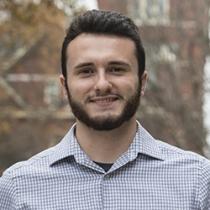
Nicholas A Branch
What is your next adventure?
I'll be coming back to Georgia Tech to work in the High-powered Electric Propulsion (HPEP) Lab with Dr. Walker. Mostly, I'll be looking at plasma material interaction because that's the big question in electric propulsion these days. When rockets re-enter the atmosphere we have to better understand what happens between materials and the plasma if we want to reduce degradation.
What about your next adventure are you most looking forward to?
Just getting into the physics side of propulsion will be exciting. A lot of the research opportunities when you're an undergrad don't allow you to control the science part. As a grad student I will be able to begin asking my own questions. Also, this summer, I will be at JPL, working on an upgrade for one of the more advanced Hall thrusters. That will be exciting.
Did you have any previous co-op, internship, or research experience in this area?
My first semester freshman year I got involved in the Prox-1 [cubesat] project with Dr. Spencer. Coming from a high school that had very little science beyond AP calc, that was the perfect learning experience for me. They didn't expect me to have already worked on advanced projects -- I didn't have to have already laser-cut a 3D printer if I wanted to join the team. I built up my knowledge and skills over two-and-a-half years. Then Dr. Walker needed someone with mechanical/hardware experience to design an ion-beam dump. I knew that would teach me vacuum hardware, so I joined him. That led to an other project helping Dr. Walker to build up the propellant feed system for a jet thruster. That was a lot of work and a lot of learning at the same time. In the Fall of 2016, I started working on another project: the magneto-hydrodynamic generator where I was designing electrodes. Ultimately we were trying to see if you could power a rocket with its own exhaust. In the Spring of 2017 I interned at NASA Marshall where I was working computer algorithms to identify mode shapes and frequencies. We got some great software out of it. This summer I worked with SpaceX, on engine-related ground support equipment for the Dragon II vehicle. This past fall, I was in the lab with Dr. Walker preparing a vacuum chamber for testing helicon plasma thruster.
How did your educational experience at GT-AE help you achieve that goal?
There is a lot of knowledge in our faculty. A lot of them have worked in the field so they can tell you how things will actually work. Dr. [Marilyn] Smith directly correlates things with how it works in industry. When you have that sort of knowledge as a foundation, it's not that hard to put all of your trust and time into a project. No matter how hard it is.
What advice would you give to an underclassman who would like to follow the same path?
Number one, if you don't like coffee, suck it up. You'll be putting in the time. Also, I had a couple of really good friends in AE which was, for me, like having work-out partners. They were motivating when I was not motivated.
And, two, find yourself a community that's not AE. For me, that was the CRC, where I worked as a building supervisor. It was completely social. Every shift there were people from other schools working with me, and we could crack jokes. It was a great support.